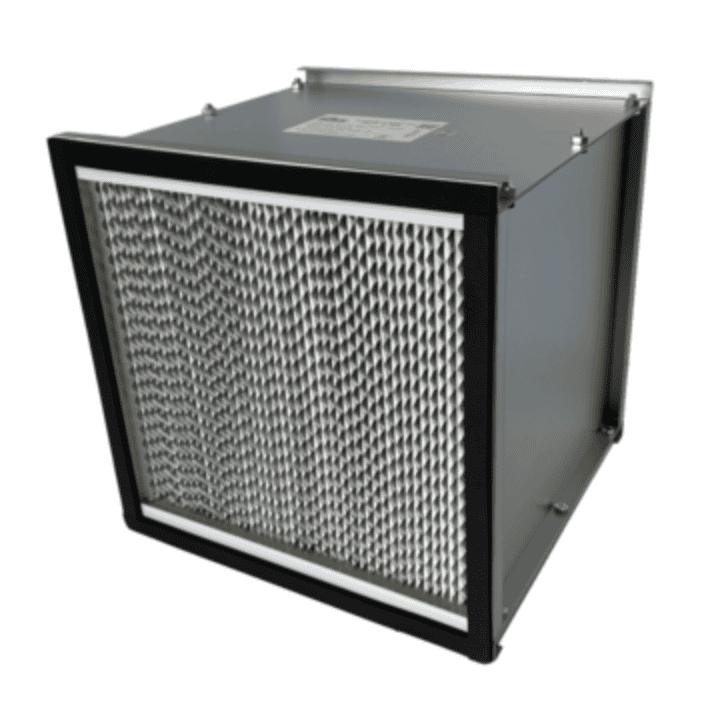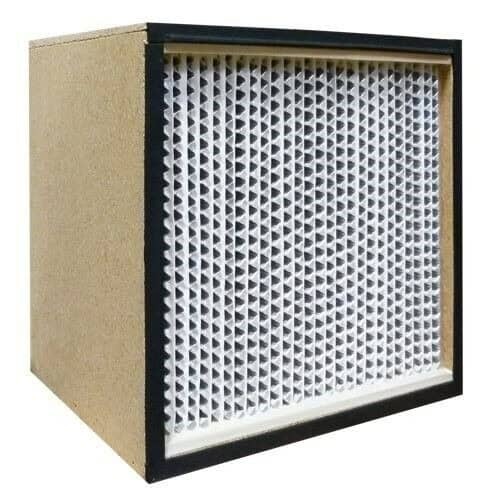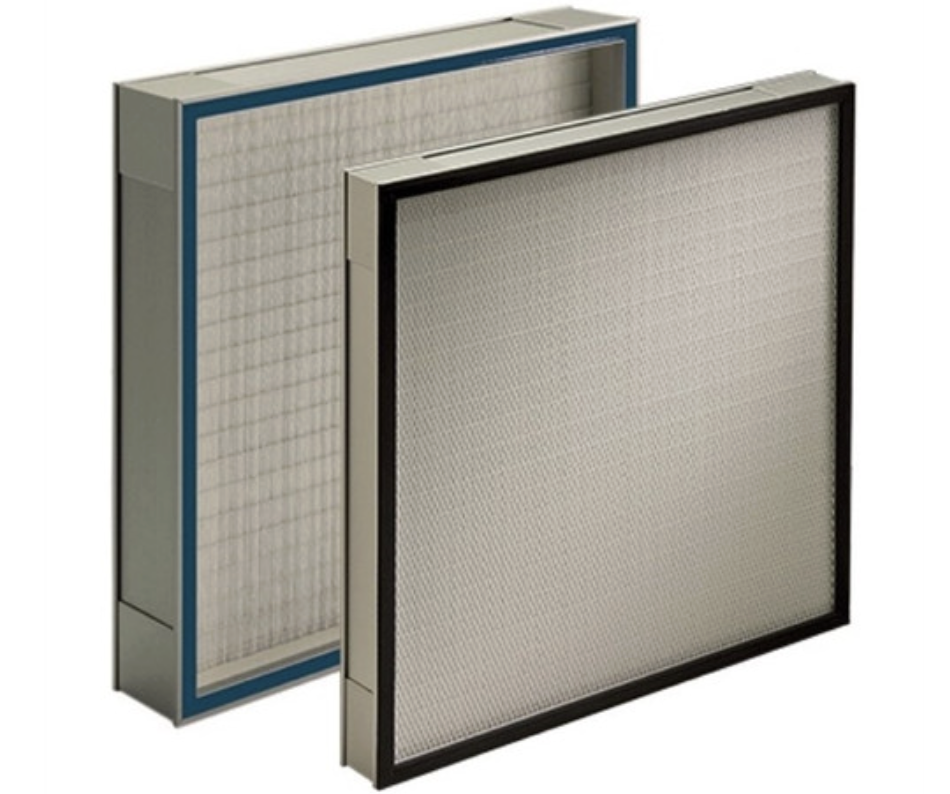Posted by Spycor LLC on Oct 15th 2025

In pharmaceutical cleanrooms where airborne contaminants can compromise product integrity and worker safety, 99.99% HEPA filters stand out as the frontline defense against particles as small as 0.3 microns. These filters, engineered with precision to capture 99.99% of microscopic pollutants, are indispensable for maintaining ISO-class environments. Brands like Koch Filter deliver models such as the BioMax CS Minipleat series, which combine compact design with superior airflow to handle demanding applications without sacrificing efficiency.
Pharmaceutical facilities rely on these high-efficiency particulate air filters to prevent cross-contamination during drug manufacturing processes. For instance, the metal frame variants provide robust construction that withstands rigorous cleaning protocols and high-humidity conditions common in sterile zones. With options like gasket or gel seals, installation becomes seamless, ensuring an airtight fit that minimizes bypass leakage. This level of performance isn't just about compliance with FDA regulations—it's about safeguarding sensitive operations where even a single rogue particle could lead to costly recalls.
Consider the 24 x 24 x 11 1/2 metal frame HEPA filter, a staple in large-scale cleanroom setups. Its galvanized steel frame resists corrosion, making it ideal for environments exposed to chemical vapors or frequent sanitization. Paired with minipleat media packs that maximize surface area, these filters achieve low pressure drops, reducing energy consumption in HVAC systems by up to 20% compared to traditional designs. Facilities upgrading from lower-efficiency filters often report immediate improvements in air quality metrics, with particle counts dropping to meet Class 100 standards effortlessly.
Beyond pharmaceuticals, these 99.99% HEPA filters excel in biotech laboratories where precision is paramount. The ability to trap bacteria, viruses, and fine dust ensures that experiments remain uncontaminated, accelerating research timelines. Koch's BioMax CS line, available in efficiencies up to 99.999%, offers versatility for specialized needs, such as viral vector production or cell culturing. With frame depths ranging from 2-3/4 inches to 11 1/2 inches, integrators can customize setups for ceiling modules or wall-mounted units, optimizing space in compact labs.
Metal Frame HEPA Filters: Engineered for
Hospital-Grade Air Purity

Hospitals demand HEPA filters that can endure constant operation while delivering uncompromised filtration. Metal frame 99.99% HEPA filters, such as those from NC Filtration, feature high-capacity designs that handle air volumes exceeding 2,000 CFM without faltering. The 20 x 24 x 11.5 model, for example, uses a rigid galvanized frame glued and stapled for maximum stability, preventing frame distortion under high-velocity airflow.
These filters incorporate waterproof glass microfiber media, sealed with closed-cell neoprene gaskets on the downstream side to eliminate leaks. In operating rooms or isolation wards, this setup captures airborne pathogens effectively, reducing infection risks by maintaining sterile air zones. Studies from healthcare engineering journals highlight how metal frame HEPA systems contribute to lower nosocomial infection rates, with efficiency ratings verified through DOP testing to ensure 99.99% particle removal.
Durability is a key selling point—metal frames resist warping from moisture or temperature fluctuations, unlike some alternatives. This makes them perfect for negative pressure rooms used in infectious disease control. Installation is straightforward, with standard sizes fitting most ductwork, and options for custom dimensions available for retrofits. Facilities managers appreciate the extended service life, often lasting 12-24 months before replacement, depending on particle load.
For high-traffic areas like emergency departments, the minipleat configuration in BioMax CS filters minimizes resistance, allowing fans to operate at lower speeds and cutting utility bills. The thermoplastic adhesive beads replace aluminum separators, enhancing energy efficiency while maintaining pleat integrity. Hospitals integrating these into central air handling units see improved IAQ scores, directly impacting patient recovery times and staff well-being.
Wood Frame HEPA Filters: Affordable High-
Performance for Biotech Labs

Biotech labs seeking cost-effective yet reliable filtration turn to wood frame 99.99% HEPA filters, which offer comparable efficiency to metal counterparts at a lower price point. Models like the 12 x 12 x 11 1/2 from Spycor's lineup use particle board frames that are lightweight and easy to handle, ideal for modular cleanroom builds.
These filters feature continuous sheets of glass microfiber media, providing uniform capture across the surface. With efficiencies of 99.99% on 0.3-micron particles, they suit applications like tissue engineering or genetic research, where budget constraints meet stringent purity requirements. The wood frame's natural insulation properties help in environments with variable temperatures, preventing condensation that could harbor microbial growth.
For larger setups, the 24 x 24 x 11.5 wood frame variant handles bulk air purification in vivariums or fermentation suites. Its high-capacity media pack extends filter life, reducing downtime for changes. Biotech firms report fewer contamination incidents after switching, attributing success to the filters' ability to trap allergens and spores that could otherwise disrupt experiments.
BioMax CS Minipleat HEPA Filters:
Innovation in Airflow and Efficiency

The BioMax CS Minipleat HEPA filters represent cutting-edge technology, with compact designs that pack more media into smaller frames for enhanced performance. Available in 99.99% and 99.999% efficiencies, these Koch Filter products use urethane-sealed minipleats to optimize airflow, making them suitable for energy-conscious facilities.
Take the 22-1/4 x 22-1/4 x 4-3/4 gel seal model—its minipleat structure reduces pressure drop by 30% versus standard pleats, translating to significant savings in fan energy. Pharmaceutical and hospital cleanrooms benefit from this, as it allows for higher air change rates without overloading systems. The gel seal option provides a knife-edge fit into housings, eliminating bypass and ensuring total filtration.
These filters shine in applications requiring ultra-low particle counts, such as semiconductor manufacturing or advanced biotech. The multiple efficiency options let users scale protection levels, from basic 99.97% for general labs to 99.999% for critical sterile filling lines. Construction details, like thermoplastic beads for pleat spacing, prevent media collapse under stress, extending operational life.
Integration into existing systems is seamless, with standard sizes fitting most bag-in/bag-out housings. Facilities using BioMax CS report compliance with EU GMP Annex 1 standards, underscoring their reliability in regulated industries.
Selecting the Ideal HEPA Filter for
Industrial and Commercial Needs

Choosing between metal and wood frame HEPA filters hinges on environmental factors. Metal frames excel in humid or chemical-heavy settings, while wood offers value in dry, controlled spaces. Efficiency ratings—99.97% versus 99.99%—depend on required purity; higher ratings suit Class 1-5 cleanrooms.
Consider airflow demands: High-capacity models like NC Filtration's support larger volumes, ideal for industrial scales. Frame size and seal type should match your system's specifications to avoid inefficiencies. Always factor in replacement intervals, influenced by particle load and pre-filter usage.
For optimal results, pair HEPA filters with negative air machines in construction or remediation projects, capturing dust at the source. Spycor's range ensures compatibility across applications, from hospitals to labs.
Click Here to explore the best 99.99% HEPA filters for your cleanroom needs at Spycor.
FAQ
What is the difference between 99.97% and 99.99% HEPA filters?
99.97% HEPA filters capture at least 99.97% of 0.3-micron particles, suitable for general cleanrooms, while 99.99% models offer higher efficiency for ultra-critical environments like pharmaceutical sterile areas, reducing contamination risks further.
How often should HEPA filters be replaced in cleanrooms?
Replacement frequency varies by usage, but typically every 6-12 months for high-traffic areas or when pressure drop exceeds 1 inch w.g. Regular monitoring with particle counters ensures timely changes.
Are metal frame HEPA filters better than wood frame ones?
Metal frames provide superior durability in moist or corrosive settings, while wood frames are lighter and more affordable for standard applications. Choose based on your environment's demands.
Can HEPA filters remove viruses and bacteria?
Yes, 99.99% HEPA filters effectively trap viruses and bacteria larger than 0.3 microns through interception, impaction, and diffusion mechanisms, making them essential for hospitals and labs.
What applications are BioMax CS Minipleat HEPA filters best for?
These filters are ideal for pharmaceutical facilities, hospitals, and biotech labs requiring low pressure drop and high airflow, such as in HVAC systems for cleanrooms.
Do HEPA filters help with energy efficiency?
Absolutely—minipleat designs like BioMax CS reduce resistance, allowing HVAC systems to run more efficiently and lowering energy costs by optimizing fan speeds.


